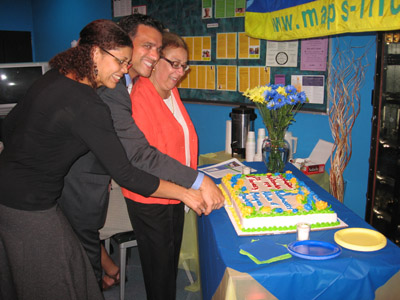October 6, 2011

Finding your way in a new country is never easy, but Dorchester’s Portuguese-speaking community gathered last week to celebrate a 10-year-old set of helping hands. Clients, employees, and supporters of the Massachusetts Alliance of Portuguese Speakers (MAPS) met in their Uphams Corner office space last Thursday to commemorate a decade of work within the Portuguese, Brazilian, and Cape Verdean communities of Dorchester.
While the event was well-attended by individuals who have received assistance through the 20-plus programs offered by MAPS, many employees said there is still much work to be done.
MAPS, originally known as the Cambridge Alliance of Portuguese Americans, was founded in 1970 by volunteers looking to guide recent Portuguese immigrants through the often confusing processes of establishing a support network in a language many clients had yet to fully grasp. Although the organization has expanded into many parts of the state with large Portuguese-speaking immigrant populations, executive director Paulo Pinto said many of the organization’s founding goals remain the same.
“The organization has evolved and changed it’s name to be more inclusive. MAPS is now a Cape Verdean, Portuguese, and Brazilian organization,” Pinto said. “Our staff, our board, our clients all come from those communities and what’s kept us together and our uniqueness is our linguistic abilities. We speak your language.”
Pinto said that while many clients visit MAPS offices looking for basic translation assistance while filling out forms, those clients often return to take advantage of more comprehensive aid. Of those services, Pinto said the citizenship, naturalization and English as a second language programs are some of the most important his organization has to offer.
“They’re really the key to what we do,” Pinto said. “If we’re trying to build capacity in our community, nothing is more important than getting our members civically involved, holding their public officials accountable but also as a way to get them that much more interested in the well-being of their neighborhoods.”
While Pinto has placed a major emphasis on encouraging civic engagement in the Portuguese-speaking community, Men’s and Women’s Health Programs supervisor Dulce Almeida said her staff’s cultural awareness puts MAPS in a unique position to broach topics in “informal but informative conversations” like AIDS and HIV awareness and domestic violence prevention that many in the community would feel uncomfortable addressing with perceived outsiders.
More importantly, Almeida said her staff is well-aware of where to find potential clients who may avoid visiting a MAPS office due to its association with health issues that often go unadressed in the community.
“Our outreach program is all about going out to places where we know we’ll find people that we need to reach,” Almeida said. “They go out to bars, events, places where we know the community will be, but other groups might not know about.”
To that end, Almeida described a successful program in which free AIDS and HIV screenings were made available in parking lots and barber shops as a way to create a more approachable atmosphere for individuals most in need.
Almeida and her staff still feel they have a long way to go before they can say their work is done, but she was quick to point out that they are making progress every day.
“I was walking past [a screening site] in Brockton and the owner looked surprised, he said ‘Oh, are you not coming today?’” Amleida said. “I think that’s a good sign, it means they know what we’re doing and it means they want to see us come by.”


